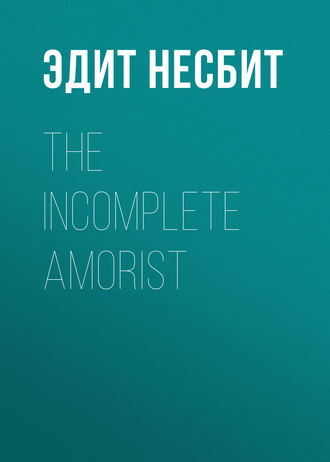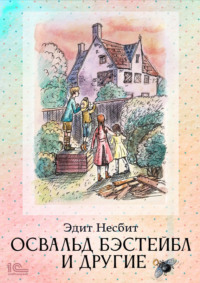 полная версия
полная версияThe Incomplete Amorist
"If she thinks I'm going to break my heart about him, she's mistaken. And so's He. I must be miserable for a bit," said Betty bravely, "but I'll not be miserable forever, so he needn't think it. Of course, I shall never care for anyone ever again—unless he were to love me for years and years before he ever said a word, and then I might say I would try.—And try. But fall in love?—Never again! Oh, good gracious, there he is,—and I've not begun to get ready."
Temple was whistling Deux Amants very softly in the courtyard below. She put her head out of the window.
"I shan't be two minutes," she said, "You might get the basket from Madame; and my sketching things are on the terrace all ready strapped up."
The hoofs of the smart gray pony slipped and rattled on the cobble-stones of the hotel entry.
"Au revoir: amuse yourselves well, my children." Madame Chevillon stood, one hand on fat hip, the other shading old eyes that they might watch the progress of the cart up the blinding whiteness of the village street.
"To the forest, and yet again to the forest and to the forest always," she said, turning into the darkened billiard room. "Marie, beware, thou, of the forest. The good God created it express for the lovers,—but it is permitted to the devil to promenade himself there also."
"Those two there," said Marie—"it is very certain that they are in love?"
"How otherwise?" said Madame. "The good God made us women that the men should be in love with us—and afterwards, to take care of the children. There is no other use that a man has for a woman. Friendship? The Art?—Bah! When a man wants those he demands them of a man. Of a woman he demands but love, and one gives it to him—one gives it to him without question!"
The two who had departed for the forest drove on through the swimming, spinning heat, in silence.
It was not till they reached the little old well by Marlotte that Betty spoke.
"Don't let's work to-day, Mr. Temple," she said. "My hands are so hot I could never hold a brush. And your sketch is really finished, you know."
"What would you like to do?" asked Temple: "river?"
"Oh, no,—not now that we've started for the forest! Its feelings would be hurt if we turned back. I am sure it loves us to love it, although it is so big—Like God, you know."
"Yes: I'm sure it does. Do you really think God cares?"
"Of course," said Betty, "because everything would be so silly if He didn't, you know. I believe He likes us to love him, and what's more, I believe He likes us to love all the pretty things He's made—trees and rivers and sunsets and seas."
"And each other," said Temple, and flushed to the ears: "human beings, I mean, of course," he added hastily.
"Of course," said Betty, unconscious of the flush; "but religion tells you that—it doesn't tell you about the little things. It does say about herbs of the field and the floods clapping their hands and all that—but that's only His works praising Him, not us loving all His works. I think He's most awfully pleased when we love some little, nice, tiny thing that He never thought we'd notice."
"Did your father teach you to think like this?"
"Oh, dear no!" said Betty. "He doesn't like the little pretty things."
"It's odd," said Temple. "Look at those yellow roses all over that hideous villa."
"My step-father would only see the villa. Well, must we work to-day?"
"What would you like to do?"
"I should like to go to those big rocks—the Rochers des Demoiselles, aren't they?—and tie up the pony, and climb up, and sit in a black shadow and look out over the green tops of the trees. You see things when you're idle that you never see when you're working, even if you're trying to paint those very things."
So, by and by, the gray pony was unharnessed and tied to a tree in a cool, grassy place where he also could be happy, and the two others took the winding stony path.
A turn in the smooth-worn way brought them to a platform overhanging the precipice that fell a sheer thirty feet to the tops of the trees on the slope below. White, silvery sand carpeted the ledge, and on the sand the shadow of a leaning rock fell blue.
"Here" said Betty, and sank down. Her sketchbook scooped the sand with its cover. "Oh, I am hot!" She threw off her hat.
"You don't look it," said Temple, and pulled the big bottle of weak claret and water from the luncheon basket.
"Drink!" he said, offering the little glass when he had filled it.
Betty drank, in little sips.
"How extraordinarily nice it is to drink when you're thirsty," she said, "and how heavenly this shadow is."
A long silence. Temple filled and lighted a pipe. From a slope of dry grass a little below them came the dusty rattle of grasshoppers' talk.
"It is very good here," said Betty. "Oh, how glad I am I came away from Paris. Everything looks different here—I mean the things that look as if they mattered there don't matter here—and the things that didn't matter there—oh, here, they do!"
"Yes," said Temple, making little mounds of sand with the edge of his hand as he lay, "I never expected to have such days in this world as I've had here with you. We've grown to be very good friends here, haven't we?"
"We were very good friends in Paris," said Betty, remembering the letter that had announced his departure.
"But it wasn't the same," he persisted. "When did we talk in Paris as we've talked here?"
"I talked to you, even in Paris, more than I've ever talked to anyone else, all the same," said Betty.
"Thank you," he said; "that's the nicest thing you've ever said to me."
"It wasn't meant to be nice," said Betty; "it's true. Don't you know there are some people you never can talk to without wondering what they'll think of you, and whether you hadn't better have said something else? It's nothing to do with whether you like them or not," she went on, thinking of talks with Vernon, many talks—and in all of them she had been definitely and consciously on guard. "You may like people quite frightfully, and yet you can't talk to them."
"Yes," he said, "but you couldn't talk to a person you disliked, could you? Real talk, I mean?"
"Of course not," said Betty. "Do you know I'm dreadfully hungry!"
It was after lunch that Temple said:
"When are you going home, Miss Desmond?" She looked up, for his use of her name was rare.
"I don't know: some time," she answered absently. But the question ran through her mind like a needle drawing after it the thread on which were strung all the little longings for Long Barton—for the familiar fields and flowers, that had gathered there since she first saw the silver may and the golden broom at Bourron station. That was nearly a month ago. What a month it had been—the gleaming river, the neat intimate simplicity of the little culture, white roads, and roses and rocks, and more than all—trees, and trees and trees again.
And with all this—Temple. He lodged at Montigny, true. And she at Grez. But each day brought to her door the best companion in the world. He had never even asked how she came to be at Grez. After that first, "Where's your party?" he had guarded his lips. It had seemed so natural, and so extremely fortunate that he should be here. If she had been all alone she would have allowed herself to think too much of Vernon—of what might have been.
"I am going to England next week!" he said. Betty was shocked to perceive that this news hurt her. Well, why shouldn't it hurt her? She wasn't absolutely insensible to friendship, she supposed. And sensibility to friendship was nothing to be ashamed of. On the contrary.
"I shall miss you most awfully," said she with the air of one flaunting a flag.
"I wish you'd go home," he said. "Haven't you had enough of your experiment, or whatever it was, yet?"
"I thought you'd given up interfering," she said crossly. At least she meant to speak crossly.
"I thought I could say anything to you now without your—your not understanding."
"So you can." She was suddenly not cross again.
"Ah, no I can't," he said. "I want to say things to you that I can't say here. Won't you go home? Won't you let me come to see you there? Say I may. You will let me?"
If she said Yes—she refused to pursue that train of thought another inch. If she said No—then a sudden end—and forever an end—to this good companionship. "I wish I had never, never seen Him!" she told herself.
Then she found that she was speaking.
"The reason I was all alone in Paris," she was saying. The reason took a long time to expound.—The shadow withdrew itself and they had to shift the camp just when it came to the part about Betty's first meeting with Temple himself.
"And so," she said, "I've done what I meant to do—and I'm a hateful liar—and you'll never want to speak to me again."
She rooted up a fern and tore it into little ribbons.
"Why have you told me all this?" he said slowly.
"I don't know," said she.
"It is because you care, a little bit about—about my thinking well of you?"
"I can't care about that, or I shouldn't have told you, should I? Let's get back home. The pony's lost by this time, I expect."
"Is it because you don't want to have any—any secrets between us?"
"Not in the least," said Betty, chin in the air. "I shouldn't dream of telling you my secrets—or anyone else of course, I mean," she added politely.
He sighed. "Well," he said, "I wish you'd go home."
"Why don't you say you're disappointed in me, and that you despise me, and that you don't care about being friends any more, with a girl who's told lies and taken her aunt's money and done everything wrong you can think of? Let's go back. I don't want to stay here any more, with you being silently contemptuous as hard as ever you can. Why don't you say something?"
"I don't want to say the only thing I want to say. I don't want to say it here. Won't you go home and let me come and tell you at Long Barton?"
"You do think me horrid. Why don't you say so?"
"No. I don't."
"Then it's because you don't care what I am or what I do. I thought a man's friendship didn't mean much!" She crushed the fern into a rough ball and threw it over the edge of the rock.
"Oh, hang it all," said Temple. "Look here, Miss Desmond. I came away from Paris because I didn't know what was the matter with me. I didn't know who it was I really cared about. And before I'd been here one single day, I knew. And then I met you. And I haven't said a word, because you're here alone—and besides I wanted you to get used to talking to me and all that. And now you say I don't care. No, confound it all, it's too much! I wanted to ask you to marry me. And I'd have waited any length of time till there was a chance for me." He had almost turned his back on her, and leaning his chin on his elbow was looking out over the tree-tops far below. "And now you've gone and rushed me into asking you now, when I know there isn't the least chance for me,—and anyhow I ought to have held my tongue! And now it's all no good, and it's your fault. Why did you say I didn't care?"
"You knew it was coming," Betty told herself, "when he asked if he might come to Long Barton to see you. You knew it. You might have stopped it. And you didn't. And now what are you going to do?"
What she did was to lean back to reach another fern—to pluck and smooth its fronds.
"Are you very angry?" asked Temple forlornly.
"No," said Betty; "how could I be? But I wish you hadn't. It's spoiled everything."
"Do you think I don't know all that?"
"I wish I could," said Betty very sincerely, "but—"
"Of course," he said bitterly. "I knew that."
"He doesn't care about me," said Betty: "he's engaged to someone else."
"And you care very much?" He kept his face turned away.
"I don't know," said Betty; "sometimes I think I'm getting not to care at all."
"Then—look here: may I ask you again some time, and we'll go on just like we have been?"
"No," said Betty. "I'm going back to England at the end of the week. Besides, you aren't quite sure it's me you care for.—At least you weren't when you came away from Paris. How can you be sure you're sure now?"
He turned and looked at her.
"I beg your pardon," she said instantly. "I think I didn't understand. Let's go back now, shall we?"
"For Heaven's sake," he said, "don't let this break up everything! Don't avoid me in the little time that's left. I won't talk about it any more—I won't worry you—"
"Don't be silly," she said, and she smiled at him a little sadly; "you talk as though I didn't know you."
CHAPTER XXVI.
THE MIRACLE
It seemed quite dark down in the forest—or rather, it seemed, after the full good light that lay upon the summit of the rocks, like the gray dream-twilight under the eyelids of one who dozes in face of a dying fire.
"Don't let's go straight back to Grez," said Betty when the pony was harnessed, "let's go on to Fontainebleau and have dinner and drive back by moonlight. Don't you think it would be fun? We've never done that."
"Thank you," he said. "You are good."
His eyes met hers in the green shadow, and she was satisfied because he had understood that this was her reply to his appeal to her "not to avoid him in the little time there was left."
Both were gay as they drove along the golden roads, gayer than ever they had been. The nearness of a volcano has never been a bar to gaiety. Dinner was a joyous feast, and when it was over, and the other guests had strolled out, Temple sang all the songs Betty liked best. Betty played for him. It was all very pleasant, and both pretended, quite beautifully, that they were the best of friends, and that it had never, never been a question of anything else. The pretence lasted through all the moonlight of the home drive—lasted indeed till the pony was trotting along the straight avenue that leads down into Grez. And even then it was not Temple who broke it. It was Betty, and she laid her hand on his arm.
"Look here," she said. "I've been thinking about it ever since you said it. And I'm not going to let it spoil anything. Only I don't want you to think I don't understand. And I'm most awfully proud that you should.... I am really. And I'd rather be liked by you than by anyone—"
"Almost," said Temple a little bitterly.
"I don't feel sure about that part of it—really. One feels and thinks such a lot of different things—and they all contradict everything else, till one doesn't know what anything means, or what it is one really—I can't explain. But I don't want you to think your having talked about it makes any difference. At least I don't mean that at all. What I mean is that of course I like you ever so much better now I know that you like me, and—oh, I don't want to—I don't want you to think it's all no good, because really and truly I don't know."
All this time she had kept her hand on his wrist.
Now he laid his other hand over it.
"Dear," he said, "that's all I want, and more than I hoped for now. I won't say another word about it—ever, if you'd rather not,—only if ever you feel that it is me, and not that other chap, then you'll tell me, won't you?"
"I'll tell you now," said Betty, "that I wish with all my heart it was you, and not the other."
When he had said goodnight at the deserted door of the courtyard Betty slipped through the trees to her pavilion. The garden seemed more crowded with trees than it had ever been. It was almost as though new trees from the forest had stolen in while she was at Fontainebleau, and joined the ranks of those that stood sentinel round the pavilion. There was a lamp in the garden room—as usual. Its light poured out and lay like a yellow carpet on the terrace, and lent to the foliage beyond that indescribable air of festivity, of light-heartedness that green leaves can always borrow from artificial light.
"I'll just see if there are any letters," she told herself. "There always might be: from Aunt Julia or Miss Voscoe or—someone."
She went along the little passage that led to the stairs. The door that opened from it into the garden room was narrowly ajar. A slice of light through the chink stood across the passage.
Oh!
There was someone in the room. Someone was speaking. She knew the voice. "She must be in soon," it said. It was her Aunt Julia's voice. She stopped dead. And there was silence in the room.
Oh! to be caught like this! In a trap. And just when she had decided to go home! She would not be caught. She would steal up to her room, get her money, leave enough on the table to pay her bill, and go. She could walk to Marlotte—and go off by train in the morning to Brittany—anywhere. She would not be dragged back like a prisoner to be all the rest of her life with a hateful old man who detested her. Aunt Julia thought she was very clever. Well, she would just find out that she wasn't. Who was she talking to? Not Madame, for she spoke in English. To some one from Paris? Who could have betrayed her? Only one person knew. Lady St. Craye. Well, Lady St. Craye should not betray her for nothing. She would not go to Brittany: she would go back to Paris. That woman should be taught what it costs to play the traitor.
All this in the quite small pause before her aunt's voice spoke again.
"Unless she's got wind of our coming and flown," it said.
"Our" coming? Who was the other?
Betty was eavesdropping then? How dishonourable! Well, it is. And she was.
"I hope to Heaven she's safe," said another voice. Oh—it was her step-father! He had come—Then he must know everything! She moved, quite without meaning to move; her knee touched the door and it creaked. Very very faintly, but it creaked. Would they hear? Had they heard? No—the aunt's voice again:
"The whole thing's inexplicable to me! I don't understand it. You let Betty go to Paris."
"By your advice."
"By my advice, but also because you wanted her to be happy."
"Yes—Heaven knows I wanted her to be happy." The old man's voice was sadder than Betty had ever heard it.
"So we found Madame Gautier for her—and when Madame Gautier dies, she doesn't write to you, or wire to you, to come and find her a new chaperone. Why?"
"I can't imagine why."
"Don't you think it may have been because she was afraid of you, thought you'd simply make her come back to Long Barton?"
"It would surely have been impossible for her to imagine that I should lessen the time which I had promised her, on account of an unfortunate accident. She knows the depth of my affection for her. No, no—depend upon it there must have been some other reason for the deceit. I almost fear to conjecture what the reason may have been. Do you think it possible that she has been seeing that man again?"
There was a sound as of a chair impatiently pushed back. Betty fled noiselessly to the stairs. No footstep followed the movement of the chair. She crept back.
"—when you do see her?" her aunt was asking, "I suppose you mean to heap reproaches on her, and take her home in disgrace?"
"I hope I shall have strength given me to do my duty," said the Reverend Cecil.
"Have you considered what your duty is?"
"It must be my duty to reprove, to show her her deceit in its full enormity."
"You'll enjoy that, won't you? It'll gratify your sense of power. You'll stand in the place of God to the child, and you'll be glad to see her humbled and ashamed."
"Because a thing is painful to me it is none the less my duty."
"Nor any the more," snapped Miss Desmond; "nor any the more! That's what you won't see. She knows you don't care about her, and that's why she kept away from you as long as she could."
"She can't know it. It isn't true."
"She thinks it is."
"Do you think so? Do you imagine I don't care for her? Have you been poisoning her mind and—"
"Oh, don't let's talk about poison!" said Miss Desmond. "If she's lost altogether it won't matter to you. You'll have done your duty."
"If she's lost I—if she were lost I should not care to be saved. I am aware that the thought is sinful. But I fear that it is so."
"Of course," said Miss Desmond. "She's not your child—why should you care? You never had a child."
"What have I done to you that you should try to torture me like this?" It was her step-father's voice, but Betty hardly knew it. "For pity's sake, woman, be quiet! Let me bear what I have to bear without your chatter."
"I'm sorry," said Miss Desmond very gently. "Forgive me if I didn't understand. And you do really care about her a little?"
"Care about her a little! She's the only living thing I do care for—or ever have cared for except one. Oh, it is like a woman to cast it up at me as a reproach that I have no child! Why have I no child? Because the woman whom Almighty God made for my child's mother was taken from me—in her youth—before she was mine. Her name was Lizzie. And my Lizzie, my little Lizzie that's lied and deceived us, she is my child—the one we should have had. She's my heart's blood. Do you think I want to scold her; do you think I want to humble her? Do you not perceive how my own heart will be torn? But it is my duty. I will not spare the rod. And she will understand as you never could. Oh, my little Lizzie!—Oh, pray God she is safe! If it please God to restore her safely to me, I will not yield to the wicked promptings of my own selfish affection. I will show her her sin, and we will pray for forgiveness together. Yes, I will not shrink, even if it break my heart—I will tell her—"
"I should tell her," said Miss Desmond, "just what you've told me."
The old man was walking up and down the room. Betty could hear every movement.
"It's been the struggle of my life not to spoil her—not to let my love for her lead me to neglect her eternal welfare—not to lessen her modesty by my praises—not to condone the sin because of my love for the sinner. My love has not been selfish.—It has been the struggle of my life not to let my affection be a snare to her."
"Then I must say," said Miss Desmond, "that you might have been better employed."
"Thank God I have done my duty! You don't understand. But my Lizzie will understand."
"Yes, she will understand," cried Betty, bursting open the door and standing between the two with cheeks that flamed. "I do understand, Father dear! Auntie, I don't understand you! You're cruel,—and it's not like you. Will you mind going away, please?"
The cruel aunt smiled, and moved towards the door. As she passed Betty she whispered: "I thought you were never going to come from behind that door. I couldn't have kept it up much longer."
Then she went out and closed the door firmly.
Betty went straight to her step-father and put her arms round his neck.
"You do forgive me—you will forgive me, won't you?" she said breathlessly.
He put an arm awkwardly round her.
"There's nothing you could do that I couldn't forgive," he said in a choked voice. "But it is my duty not to—"
She interrupted him by drawing back to look at him, but she kept his arm where it was, by her hand on his.
"Father," she said, "I've heard everything you've been saying. It's no use scolding me, because you can't possibly say anything that I haven't said to myself a thousand times. Sit down and let me tell you everything, every single thing! I did mean to come home this week, and tell you; I truly did. I wish I'd gone home before."
"Oh, Lizzie," said the old man, "how could you? How could you?"
"I didn't understand. I didn't know. I was a blind idiot. Oh, Father, you'll see how different I'll be now! Oh, if one of us had died—and I'd never known!"
"Known what, my child? Oh, thank God I have you safe! Known what?"
"Why, that you—how fond you are of me."
"You didn't know that?"
"I—I wasn't always sure," Betty hastened to say. A miracle had happened. She could read now in his eyes the appeal that she had always misread before. "But now I shall always be sure—always. And I'm going to be such a good daughter to you—you'll see—if you'll only forgive me. And you will forgive me. Oh, you don't know how I trust you now!"
"Didn't you always?"
"Not enough—not nearly enough. But I do now. Let me tell you—Don't let me ever be afraid of you—oh, don't let me!" She had pushed him gently into a chair and was half kneeling on the floor beside him.











